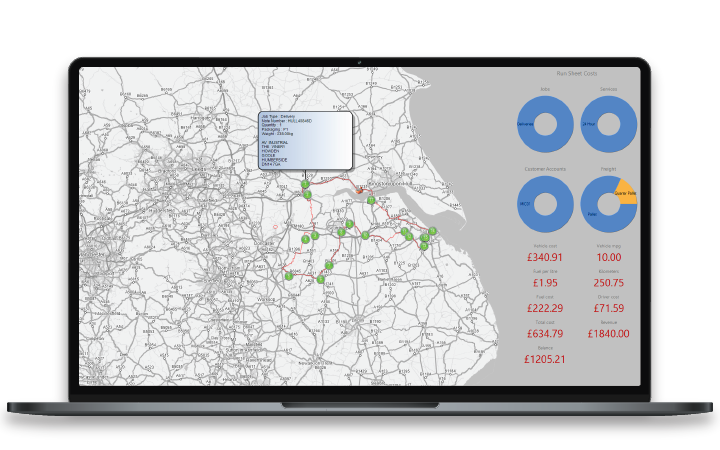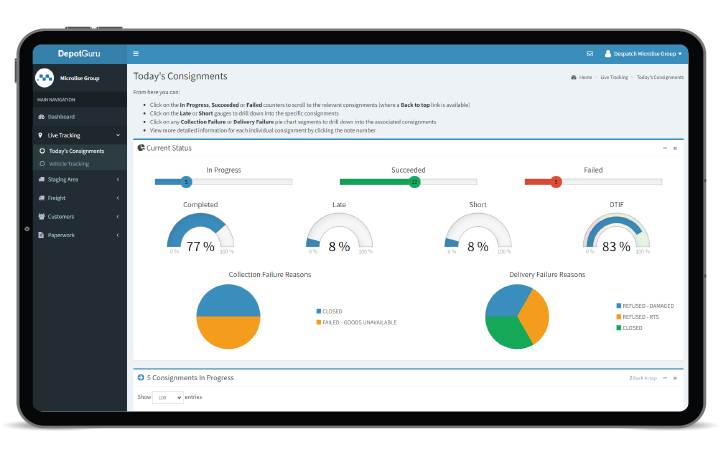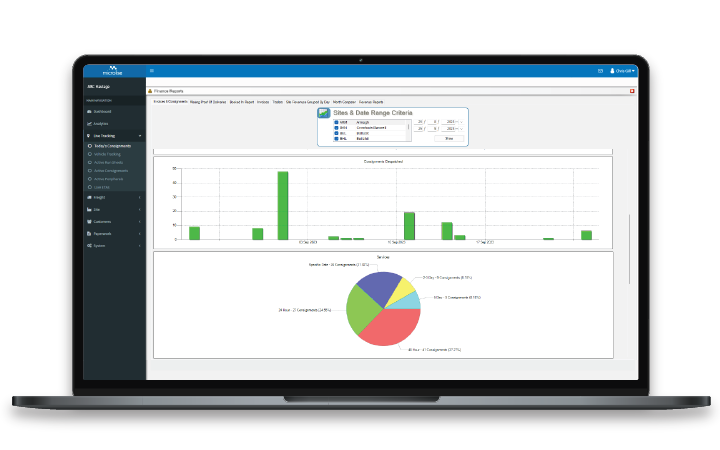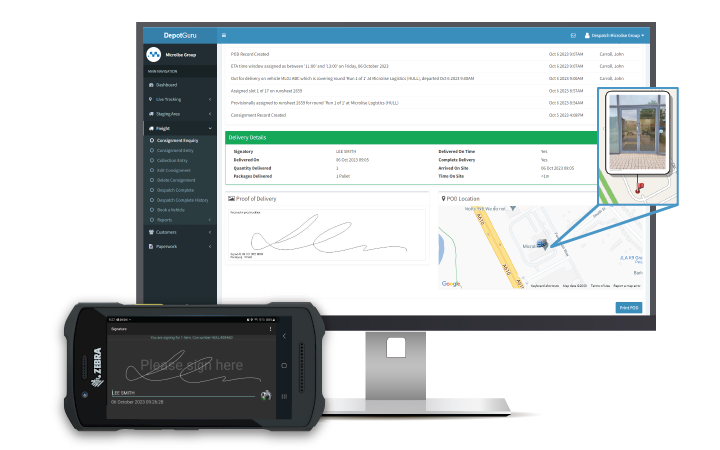Unlock Efficiency & Control with Microlise TMS Software
Transport management software for fleet’s of all sizes, our TMS system empowers transport managers to:
Transport management software for fleet’s of all sizes, our TMS system empowers transport managers to:

Manage orders, either by creating them in the system, letting customers create them directly or by importing them in bulk

Greatly increase cash flow by streamlining your invoicing

Apply rate cards to specific customers so that job costing becomes intuitive and easy

When multiple jobs are raised for the same destination, the system will automatically consolidate loads to minimise the resources needed and reduce wasted miles

Assign jobs to a run, manage the resources and plan routes accordingly giving the driver all they need to get on with their day

All job details are available on the drivers handheld device - right down to consignment and item level

Our Transport management system will reduce operational costs by:

Deliver goods on time, every time. Impress your customers with accurate ETAs and easy tracking options, leading to increased satisfaction and loyalty.
Also allow your customers to book jobs directly through their portal in the TMS software, notify them when they’ve been received… and offer them full visibility of their goods in transit.

In this guide you will learn why it’s important to go digital, what a TMS can offer and the key benefits of a TMS. You will also find useful advice on what to consider when buying a TMS.
Download your guide
Our transport management system reduces paperwork through automation and digitisation of various logistics and transportation processes, such as:

Automate key processes, from order to invoice. Our cutting-edge transport management system is designed to streamline your entire transportation process.
Automate routine tasks, from order management to carrier selection, and help your operation to save time, minimise manual processes and reduce resource levels.
A Transportation Management System (TMS) is a software solution that streamlines and optimises the planning, execution, and management of transportation and logistics operations. It serves as a centralised platform for businesses to efficiently handle tasks related to shipping, carrier selection, route optimisation, and cost management. A TMS automates manual processes, such as order creation and tracking, rate management, and document handling, reducing paperwork and human errors.
Key features of a TMS include real-time visibility into shipments, carrier communication, cost calculation, and reporting tools for data-driven decision-making. It helps organisations enhance efficiency, reduce transportation costs, improve customer service through on-time deliveries, and maintain compliance with regulations. Ultimately, a TMS plays a pivotal role in enhancing supply chain operations, increasing productivity, and achieving a competitive edge in today's complex logistics landscape.
1. Cost Savings: TMS optimises routes, reduces empty miles, and helps negotiate better rates with carriers, resulting in significant cost reductions.
2. Efficiency: Automation of manual tasks like order management and carrier selection increases operational efficiency, saving time and resources.
3. Visibility: Real-time tracking and monitoring of shipments provide end-to-end visibility, enhancing control over the supply chain.
4. Improved Customer Service: Accurate ETAs, reduced delivery errors, and better communication with customers lead to improved customer satisfaction.
5. Data-Driven Decisions: TMS generates valuable data and reports, empowering businesses to make informed, strategic decisions.
6. Compliance and Accuracy: TMS helps ensure compliance with regulations and minimises errors in documentation and invoicing.
7. Scalability: Adaptable to business growth, TMS supports companies of all sizes.
8. Sustainability: Efficient route planning reduces fuel consumption and environmental impact.
9. Inventory Management: Optimised transportation processes contribute to better inventory control.
10. Competitive Advantage: TMS adoption can differentiate a business in a competitive market by enhancing logistics operations and customer service.
1. Cost Efficiency: TMS optimises routes, reduces shipping costs, and helps negotiate favourable carrier rates, resulting in substantial cost savings.
2. Enhanced Visibility: Real-time tracking and monitoring of shipments offer comprehensive supply chain visibility, ensuring proactive issue resolution and better customer service.
3. Streamlined Operations: TMS automates manual processes like order management and carrier selection, leading to improved operational efficiency and reduced errors.
4. Data-Driven Decisions: TMS provides invaluable data insights and reporting tools, enabling informed, strategic decision-making to drive business growth.
5. Compliance and Accuracy: It ensures compliance with regulations and minimises errors in documentation, reducing legal and financial risks.
6. Customer Satisfaction: Accurate ETAs and streamlined processes result in on-time deliveries and improved customer satisfaction.
7. Sustainability: By optimising routes and reducing empty miles, TMS contributes to environmental sustainability.
8. Scalability: It accommodates businesses of all sizes, supporting growth and expansion.